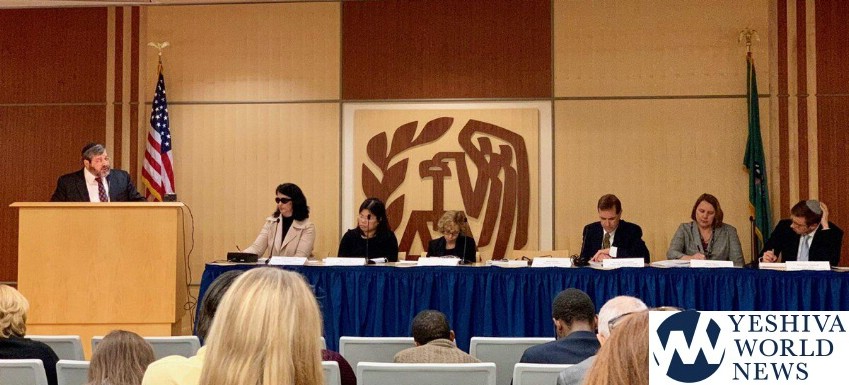Agudath Israel of America welcomes the notice that accompanied final regulations issued Tuesday by the US Department of the Treasury and the Internal Revenue Service (IRS). Tuesday’s notice ensures that in limited situations, certain taxpayers contributing to scholarship tax credit programs will not be penalized for their donation. This is good news for the hundreds of thousands of students across the country receiving tuition scholarships funded through tax credit programs. More specifically, this past Tuesday’s final regulations generally require taxpayers to reduce the amount of their charitable contribution deduction by the amount of any state or local tax credits received in exchange for the contribution (the “quid pro quo rule”).
Without Tuesday’s notice, this new quid pro quo rule would have had the effect of harming those taxpayers below the 2017 Tax Cuts and Jobs Act’s $10,000 limit on deductions for state and local taxes (the “SALT cap”). Tuesday’s notice allows certain taxpayers contributing to scholarship tax credit programs to elect to treat the contribution as a deductible payment of state or local taxes, up to the SALT cap. Without the notice, under Tuesday’s finalized quid pro quo rule, a donor receiving a state tax credit for the contribution would have had no charitable contribution deduction for the portion of the donation that was awarded a tax credit. The notice’s welcome reprieve from some of the harmful effects of the quid pro quo rule applies only to individual taxpayers who are under the $10,000 limit on the deduction for state and local taxes. The rules are complex and a competent tax advisor must be consulted.
Last August, Treasury and the IRS released proposed rules that were meant to block attempts by certain states trying to get around the SALT cap. These states attempted to enable taxpayers to treat certain payments to the state as “charitable contributions,” which, unlike taxes, would not be subject to the SALT cap. The IRS responded by proposing the quid pro quo rule, requiring taxpayers to subtract the full state tax credit – including those granted for donations to state scholarship funds – from their federal charitable contribution, thus reducing or eliminating the value of the contribution and relevant deduction.
In written comments and oral testimony, Agudath Israel and its allies expressed the concern related by scholarship organizations that if donors were prevented from taking a federal deduction for those contributions, some would withhold future contributions, leaving thousands of low-income students without a scholarship. Agudath Israel asked the IRS to narrow the scope of the regulations. Agudath Israel is grateful to the Treasury Department for carefully considering and addressing many of its comments, despite that it did not agree with Agudath Israel in many important respects. Thankfully, the Administration did accept some of Agudah’s recommendations and found a way, in the form of the new notice, to accomplish its objectives while somewhat minimizing the potential damage to existing school choice programs and the students who benefit from them.
Agudah’s work is not done, though. Many potential donors to scholarship tax credit programs will still be dissuaded by the quid pro quo rule, particularly those above the SALT cap. Agudah will continue to advocate for rules that encourage donations to scholarship tax credit programs.
“The final regulations did not address all of the issues raised by Agudath Israel and other advocates; however, Tuesday’s guidance is a significant step in the right direction,” said Rabbi Abba Cohen, Agudath Israel’s Vice President for Government Affairs. “Most importantly, it recognizes the importance that school choice has in the eyes of this Administration, and for that we are grateful.”
Scholarship tax credit programs, which currently operate in eighteen states, incentivize charitable donations to scholarship granting organizations by offering taxpayers a state tax credit, generally ranging from 50-100% of the amount of the contribution. The scholarship organization then distributes those funds to eligible, mostly low-income students to attend the private school of their choice. Agudath Israel has played a key role in the advocacy and implementation of scholarship tax credit programs across the country, enabling thousands of students to afford Jewish schools.
Agudath Israel appreciates the leadership of US Secretary of Education Betsy DeVos on this issue and is thankful to Providence attorney Marc (Menasheh) Lewin, Esq., who provided advice and input along with Baltimore attorney Stuart Schabes, Esq.
(YWN World Headquarters – NYC)











